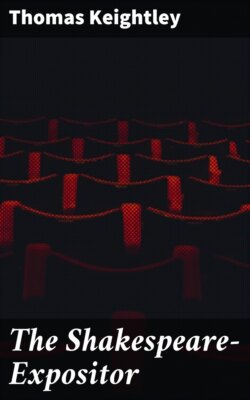Читать книгу The Shakespeare-Expositor - Thomas Keightley - Страница 48
На сайте Литреса книга снята с продажи.
3.
ОглавлениеNow the plays of Shakespeare are, as is well known, full of passages of which it is nearly impossible to make any good sense, and they abound in imperfect and inharmonious verses. On the other hand, the poems of Venus and Adonis, and of Lucrece, which he himself probably saw through the press, are almost entirely free from error, and do not contain a single unmelodious verse. The natural inference, then, is, that the defects of the plays are all owing to the transcribers and printers, and that the correction of them and the restoration of sense and melody, when possible, is the legitimate office of sound emendatory criticism. The truth of this has been felt from the very beginning; for in the 2nd folio, published in 1632, only nine years after the first, there are numerous corrections, which must have been made by the editor solely on his own authority, for, many of them being very bad, he could not have derived them from any manuscripts. And the same is the case in the subsequent folios, of all of which there are many copies in existence, like that which Mr. Collier met with to his misfortune, and which has excited such a storm in a puddle—of which, by the way, my own opinion is that the corrections in it were made between 1744, the date of Hanmer's, and 1765, that of Johnson's edition; whence I only cite it for the corrections later than the former date. These contain manuscript corrections, some, like that copy, anonymously, others by Southern and other men of repute. In the beginning of the last century Rowe gave the first example of an annotated edition of Shakespeare's works, and from that time to the present edition has succeeded edition bearing the names of critics of various degrees of ability and eminence, but all agreeing in the necessity of revising the text and rendering it as correct as may be possible.
Of the early editors, Rowe and Pope made little more than the most obvious corrections, Warburton, always ingenious and almost always wrong, made notwithstanding some that were very good, as also did Hanmer. But they were all eclipsed by Theobald, one of the acutest emendatory critics that this country has produced, whose merits, though long clouded through the malignity of Pope, are now fully acknowledged. Capell, the next in order of time, also rendered good service; but Johnson, Steevens, and Malone have done much less than might have been expected. Of these the last was a native of Ireland, the only emendatory critic that country has produced; and, in my opinion, he is not at all inferior to his English rival Steevens. That true critic Tyrwhitt should also be noticed as an emendator of a high order. It is surprising how little has really been done in the present century; and I was perfectly astonished to find what a number of passages still remained in a corrupt or imperfect state when I ventured on the task of emendation. It would seem as if critical sagacity, low in rank as it may be, is one of those talents most rarely bestowed; and besides, print appears to exercise almost a magic power over most persons; they seem to think that what is in print cannot be wrong: it is in fact only very few minds that can fully emancipate themselves from its influence. It must, however, be remembered that alteration and critical emendation are widely different. The former is in the power of almost any one; the latter, as I said, requires a peculiar faculty. It is a curious fact that in nothing does critical sagacity show itself more than in, as I may say, seeing what is before the eyes. For an instance see the first note on Henry V. Another curious fact is this, that poets (Coleridge for example) are rarely good emendators. It is, in fine, the merest folly, and a proof of the grossest ignorance, to sneer at such labours and represent them as needless, if not mischievous. Editors, however, ought to be very cautious about introducing their conjectures into the text, and should place them only in notes, unless when they are such as must almost command assent, and the place corrected had previously yielded no tolerable sense or metric melody. It is a good rule to let well alone, as we say, and not to alter what gives tolerable good sense. I have, I believe, transgressed this rule only in a couple of places.
